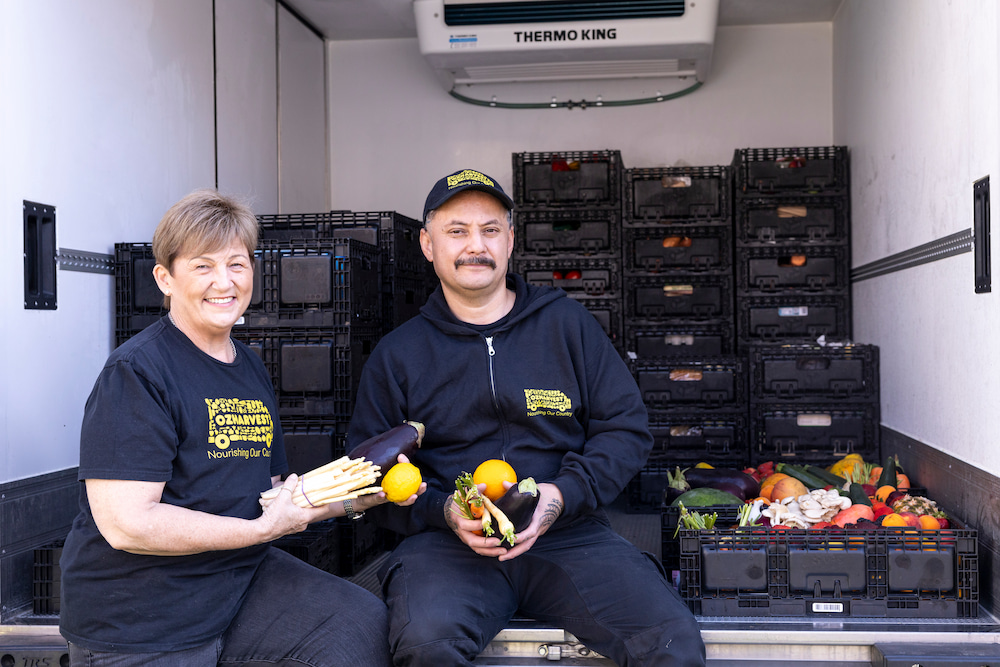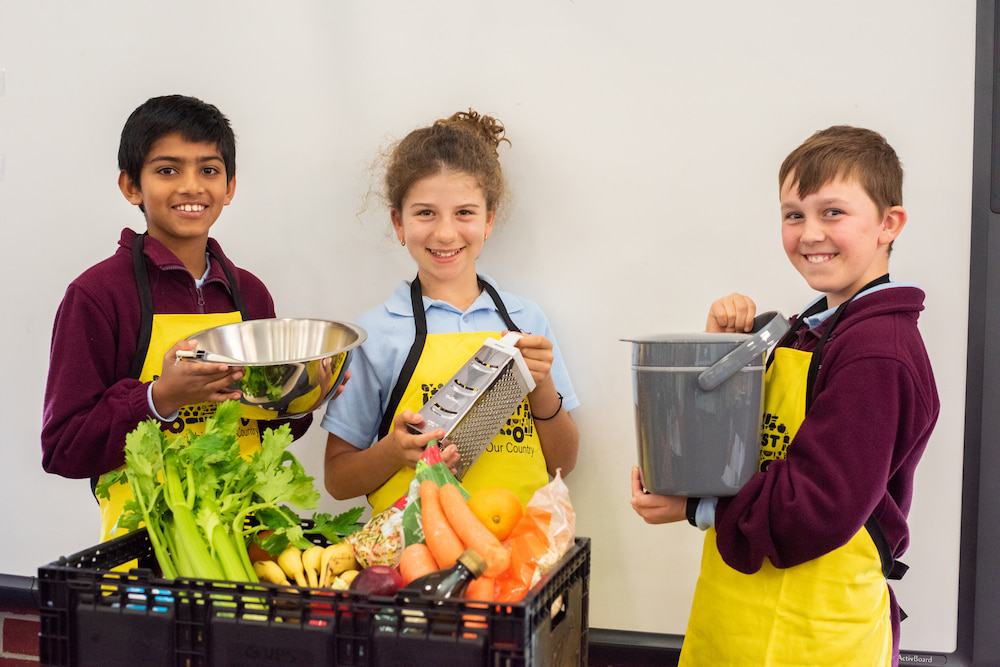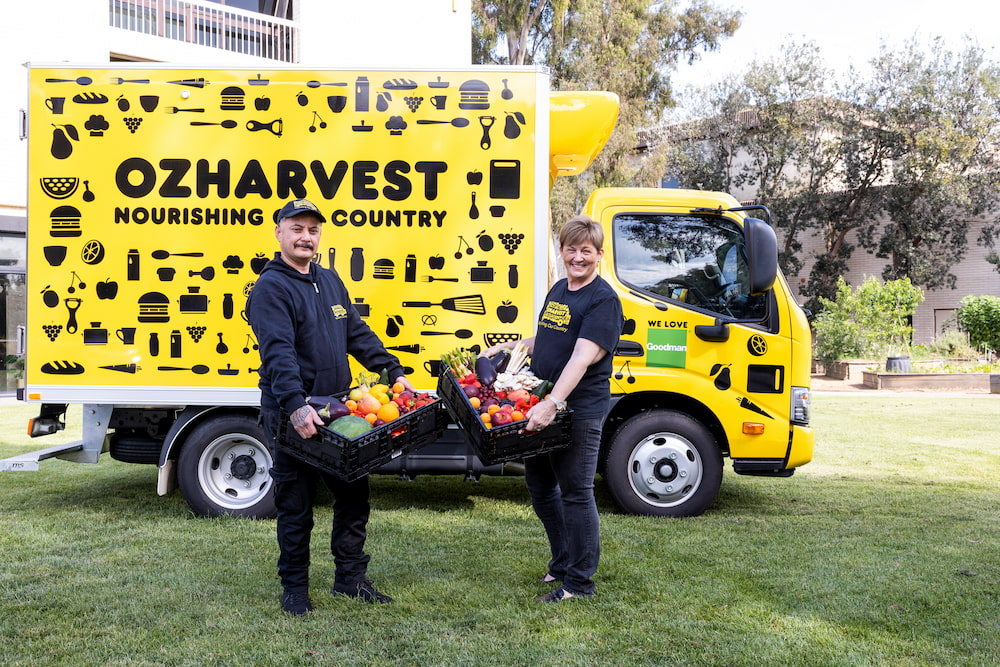As more local residents struggle to put food on the table due to rising costs and mortgage stress, food assistance charity OzHarvest Canberra has had a record busy year: it rescued nearly 543,000 kg of food from landfill, and delivered almost 1.1 million free meals, or nearly 21,000 per week – including the 10 millionth meal since it began in 2008.
But Canberra city manager Bin Barnier says: “We’re still not meeting demand. That’s the tragedy of it all…
“There are people in need around every corner… Two-income families with children are suddenly out of pocket. Something’s got to give. They’ve got to pay the mortgage. Do they drop health funds, or do they not buy new school shoes, or do they not eat well this week?”
Last year, 31 per cent of people sought assistance for the first time, while demand rose by 73 per cent in May alone.
“The experience of OzHarvest shows that more and more people are relying on rescued food and charity,” said Peter Gordon, CEO of community foundation Hands Across Canberra. “The increased demand is worrying.”
Determined that nobody go hungry, OzHarvest Canberra’s drivers and volunteers collect leftover food from supermarkets, farmers’ markets, farms and dairies, as well as institutions like the National Gallery or the Arboretum. Every kilogram of food rescued supplies two meals. All the food is supplied, collected, and handed onto charities at no charge.
“We’re there to help build resilience by providing nourishing food, to nourish people mentally and physically,” Ms Barnier said.
“If they’re healthy physically, then they can look for work or be educated.
“But if people aren’t nourished, it’s a very sad day in Australia, because there’s a lot of food out there.”

To meet the rising demand, and rescue and deliver more food more reliably, OzHarvest acquired a third van in November. They can now pick up 43,000 kg per month, rather than only 27,000 kg. It has made an enormous difference, Ms Barnier believes. Having only two vans meant that if one driver was sick, they would lose half the food available; now, the loss is down only a third.
The drivers, too, are happier: “Before, I have never been able to see our drivers come in looking fresh and not absolutely spent,” Ms Barnier said.
OzHarvest’s donors also supply more food. The charity likes to pick up an average of 60 kg from each donor, Ms Barnier said. In the past few weeks, they have picked up more than 170 kg from each one – nearly triple what they had hoped.
OzHarvest Canberra’s food rescue service delivery equates to 50 cents per meal; the $1 donation provides two meals. In 2023, with the assistance of their dedicated volunteers, OzHarvest delivered 1,085,874 meals to support charities in the region.
OzHarvest also runs two education programs. FEAST (Food Education and Sustainability Training) teaches primary and high school students about food waste and its environmental impact, healthy eating, and easy classroom cooking. The program has been taken up by 1,000 schools across Australia, including 36 (25 primary and 11 high schools)in the ACT.
“A lot of students are now cooking at home, and they’re really enthusiastic,” Ms Barnier said.
At St Joseph’s Primary School, O’Connor, for instance, FEAST has become a rite of passage, she said.
“The kids get so excited that they end up eating their own food, stuff that you’d never expect them to eat at home… Because they’ve made it together, and all the recycling has been done, they’re so proud of themselves.”

Ryan McGee, the school’s sustainability co-ordinator, believes it is important to teach young people real-life skills they can apply outside the classroom.
“I’ve loved seeing them work through the [FEAST] curriculum with a sense of pride and ownership, especially when they create a recipe that reduces waste and tastes delicious, too,” he said. “FEAST inspires students to make changes at home and school.
“Over time, the children’s behaviour at home shifted from simply identifying food waste to working out how to use what they had. They came up with ideas such as making a tart with lemons from their garden and cooking pikelets using brown bananas.”
One parent, Julie-anne, said she had seen a big shift in her kids: “They’re more involved at home and make me more accountable for not wasting so much food.”
NEST (Nutrition Education Skills Training) is a six-week course run by nutritionists teaching healthy eating, budgeting, and affordable cooking to adults, so they can provide for themselves and their family in an economical and sustainable way, Ms Barnier said. The University of Wollongong found that results were greater than the anticipated outcome, but the program must be ongoing and reinforced.
She believes that a centrally located kitchen would open up NEST for communities. At the moment, the nutritionists have to take their pots and pans with them when they run the course at Havelock House, the YWCA, or the PCYC.
“Imagine what we could achieve to break the cycle of poverty if we had a purpose-built facility with a kitchen!” Ms Barnier said.
Could the private sector help with a purpose-built or revamped home? Ideally, it would be co-located with similar organisations like Lids4Kids, Roundabout Canberra, and GIVIT.
“I have an abundance of volunteers; they don’t,” Ms Barnier said. “I’m more than happy to share my volunteers and to share the resources.”
Following the “huge year” that was 2023, this year is about consistency, consolidation, and collaboration, and providing a more reliable service, Ms Barnier said. “But we want to share this discussion with all stakeholders, whether it be retailers, farmers, educators, the ACT Government, or the private sector.”
She wants to host a Tuesday morning tea where volunteers can plan how to obtain the kitchen or find funding for the FEAST and NEST programs. She asks anyone with an advocacy or policy writing background who believes they can further the food initiative to contact her.
“We’ve got pretty much a hand-to-mouth existence,” Ms Barnier said.
“There’s plenty of food out there; we could get more food if we had more funds, and if we had an office that wasn’t just four walls, because four walls don’t cook a meal and don’t pass on skills. We have the education modules; we’ve got the cooking books; we’ve got the teacher resources that can be passed on. And we’d we like to be more than just one part of the puzzle. We’d like to connect to all the other stakeholders in the situation and share the resources.”
In this election year, Ms Barnier will lobby the ACT Government to ensure students are educated about food.
“They’re the champions, the eco-warriors of the future,” she said. “If they’re inspired, they can change the habits of their parents.”
She would like the ACT and federal governments to fund a stewardship program to foster understanding about nourishing food, like Germany’s National Strategy for Food Waste Reduction, which aims to halve per-capita food waste, and where retailers invest some of their turnover to foster good practices in sustainability and to enable food rescue.
“We’d like to be out of business,” Ms Barnier confesses.
“Ideally, we’d like to see no waste; we’d like to see everybody fed and educated, and everybody’s composting, has their own veggie patch, and no-one goes hungry. But that’s not where we are at the moment.”
Until that happy day, the community can help to raise funds for OzHarvest by taking part in the ACT Government’s container deposit scheme. ReCollect picks up cans, bottles, cartons, juice boxes, and poppers; the 10-cent refund will be donated to OzHarvest. It has brought in $10,000 since July, but Ms Barnier believes Canberrans can raise as much as $50,000 this year; there are, she notes, $10 million worth of bottles and cans out there to be recycled. Streets and apartment blocks can register as a pick-up site. That is her challenge to Canberra’s suburbs.
For more information or to donate to OzHarvest, visit ozharvest.org/your-local-ozharvest/canberra/. All funds donated to OzHarvest Canberra stay local.



